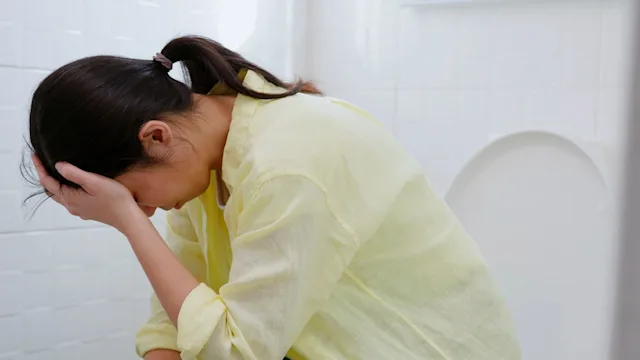Key takeaways:
Diuretics (water pills) are commonly prescribed to manage high blood pressure, heart failure, and fluid buildup from kidney or liver problems. They work by removing excess fluid and salt through your urine.
You may not need to drink more water while taking a diuretic. But the amount you should drink can depend on factors such as your overall health, the type of diuretic, and underlying conditions such as heart failure or kidney disease. Your healthcare team can give you specific recommendations.
Diuretics can lead to dehydration and electrolyte imbalances. Because of this, it’s essential to monitor your fluid intake and watch for symptoms such as lightheadedness, dry skin, and dark urine.
Diuretics, often called “water pills,” help your body get rid of extra salt and fluid by increasing urine production. They’re commonly prescribed for medical conditions like high blood pressure, heart failure, and fluid buildup caused by liver or kidney problems.
Diuretics work well to get rid of fluid. But they can also cause side effects such as dehydration and electrolyte imbalances as a result. This may leave you wondering how much water you should drink to stay hydrated while letting the diuretic do its job. We answer this question and more below.
1. How much water should you drink while taking water pills?
The amount of water you should drink while taking water pills isn’t the same for everyone. It depends on several factors, including your overall health, the type of diuretic, and whether you have an underlying condition like heart failure or kidney disease.
Search and compare options
For healthy adults, general fluid intake guidelines recommend about 3.7 L (125 oz) of fluids per day for men and 2.7 L (91 oz) for women. This includes water, other beverages, and fluids from food.
If you’re taking a diuretic, you may not necessarily need to drink more water. But your hydration needs may differ based on your health history and lifestyle. Here are a few examples.
Health conditions: If you have heart failure, kidney disease, or liver disease, your prescriber might recommend restricting your fluid intake to avoid worsening fluid buildup.
Dehydration: If you’re prone to dehydration, you may be told to drink more water to counteract the increased fluid loss from your diuretic.
Type of diuretic: Different types of diuretics can affect fluid and electrolyte levels in unique ways, which may impact how much water you should drink. For example, loop diuretics like furosemide (Lasix) tend to cause more fluid loss.
Other factors: The weather and your level of physical activity can also influence how much water you need. Hot days or exercise increase fluid loss through sweat, which means you may need to drink more to stay hydrated.
Because hydration needs vary widely and can change over time, be sure to follow your healthcare team’s recommendations. They can offer advice for your specific situation and adjust it as your condition or treatment changes.
2. Do water pills dehydrate you?
Yes, water pills can cause dehydration. This is because they make you pee more to remove excess fluid. This can be helpful for managing certain health conditions. But it can also sometimes lead to dehydration and electrolyte imbalances.
Here are a few tips to lower your risk of dehydration while taking a diuretic:
Track your fluid intake. Keep a record of how much water you’re drinking each day. It also helps to make hydration a habit by drinking water at regular intervals, especially if you aren’t getting enough.
Eat hydrating foods. Fruits and vegetables like watermelon, cucumbers, and zucchini can help boost your fluid intake.
Avoid alcohol. Alcoholic drinks can increase fluid loss through urination, which can cause or worsen dehydration.
Diuretic comparison: There are many diuretics (water pills) to choose from. Here’s how different types of diuretics compare and factors your prescriber may consider when selecting one for you.
What's the best drink for staying hydrated? For most people, water is ideal for hydration. But other drinks can also help you stay hydrated. Here's what's worth trying — and what to avoid.
When should you get medical help for dehydration? Learn the signs of severe dehydration, so you’ll know when to head to the ER to get checked out.
If you become dehydrated, be sure to rehydrate by drinking fluids as soon as possible. But you should go to the ER if you have symptoms of severe dehydration, such as:
Confusion
Fainting
Dark urine or little to no urine
Heart rate over 100 beats per minute
Extremely dry skin that doesn’t bounce back when pinched
Extreme lightheadedness
3. When is the best time to take a diuretic?
Unless your prescriber gave you specific instructions, it’s generally best to take diuretics in the morning. Most diuretics cause you to urinate more during the hours after you take your dose. So, taking it earlier in the day can help reduce the likelihood of nighttime trips to the bathroom.
Read more like this
Explore these related articles, suggested for readers like you.
If you’re prescribed more than one dose per day, talk to your prescriber about taking your last dose in the late afternoon or early evening. This can help minimize sleep disruptions. Taking diuretics too late in the day can lead to frequent nighttime urination, which can affect your sleep quality. It can also increase your risk of falls if you get up during the night.
Your healthcare team can help you figure out a time to take your diuretic that fits with your schedule and lifestyle.
4. Can diuretics cause kidney stones?
Yes, diuretics may increase the risk of kidney stones. But this can depend on the type of diuretic you’re taking. Some diuretics can help prevent kidney stones, while others can make them more likely to form.
Thiazide diuretics: Thiazide diuretics are often used to help prevent kidney stones. This is because they reduce the amount of calcium excreted in the urine, which can lower the risk of calcium-based stones.
Loop diuretics: Loop diuretics can raise your risk of developing kidney stones by increasing calcium in the urine.
Triamterene: This potassium-sparing diuretic has also been linked to kidney stone formation. But the risk appears to be low.
If you have a history of kidney stones, let your prescriber know before starting a diuretic. They can choose the most appropriate option for your condition and provide tips to help reduce your risk.
5. Can diuretics cause muscle cramps?
Yes. Diuretics can cause muscle cramps, likely from dehydration and electrolyte imbalances. These medications can lead to the loss of potassium, magnesium, and calcium through urine, all of which are essential for muscle function. Muscle cramps can happen if these minerals aren’t in balance.
Certain factors may raise your risk of muscle cramps while taking a diuretic, including:
Higher doses of diuretics
Medical conditions that raise your risk for electrolyte imbalances, such as kidney disease
Older age
Medications that can cause dehydration or electrolyte changes
Illness that causes vomiting or diarrhea
Contact your prescriber if you’re having muscle cramps. They may run some tests to check your electrolyte levels.
The bottom line
Diuretics work well to remove excess fluid from the body. But they can sometimes cause dehydration and electrolyte imbalances.
You may not need to drink more water while taking a diuretic. How much you should drink can depend on factors such as your health conditions and the type of diuretic.
Your healthcare team can give you specific guidance on fluid intake. Be sure to watch for dehydration and seek emergency care if you have symptoms such as confusion, dark urine, or a fast heart rate.

Why trust our experts?



References
Casu, G., et al. (2015). Diuretic therapy in heart failure – current approaches. European Cardiology Review.
Dhondup, T., et al. (2017). Acid-base and electrolyte disorders in patients with and without chronic kidney disease: An update. Kidney Diseases.
Grannell, L. (2019). When should I take my medicines? Australian Prescriber.
Matlaga, B. R., et al. (2003). Drug-induced urinary calculi. Reviews in Urology.
Mosenkis, A., et al. (2007). Muscle cramps and diuretic therapy. The Journal of Clinical Hypertension.
National Institute of Diabetes and Digestive and Kidney Diseases. (2021). Diuretics. LiverTox: Clinical and Research Information on Drug-Induced Liver Injury [Internet].
Pearle, M. S., et al. (2014). Medical management of kidney stones: AUA guideline. Journal of Urology.
Shrimanker, I., et al. (2023). Electrolytes. StatPearls.
Smetana, G. W., et al. (2015). Triamterene in the treatment of hypertension: More than just potassium sparing? Journal of General Internal Medicine.

















